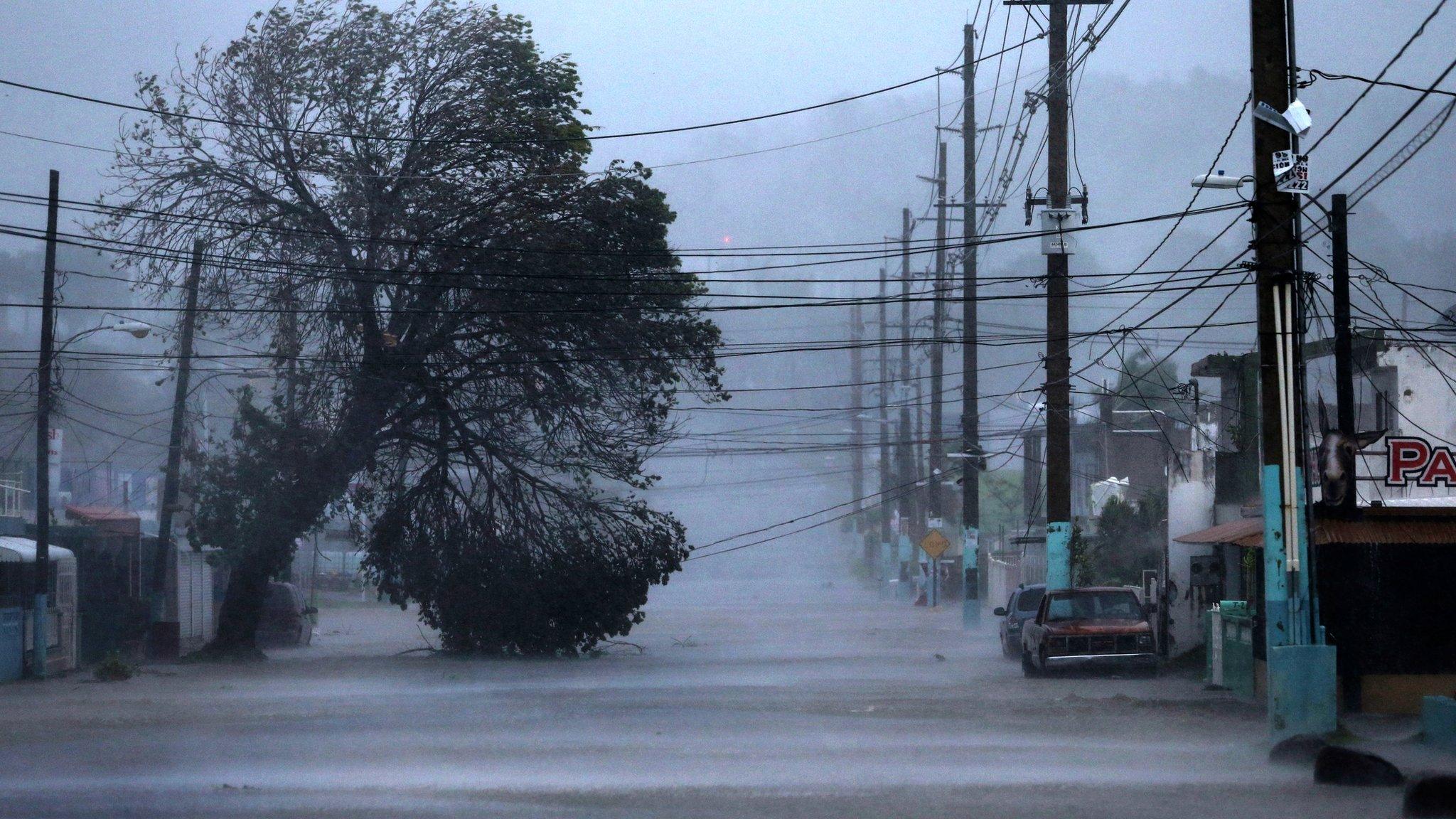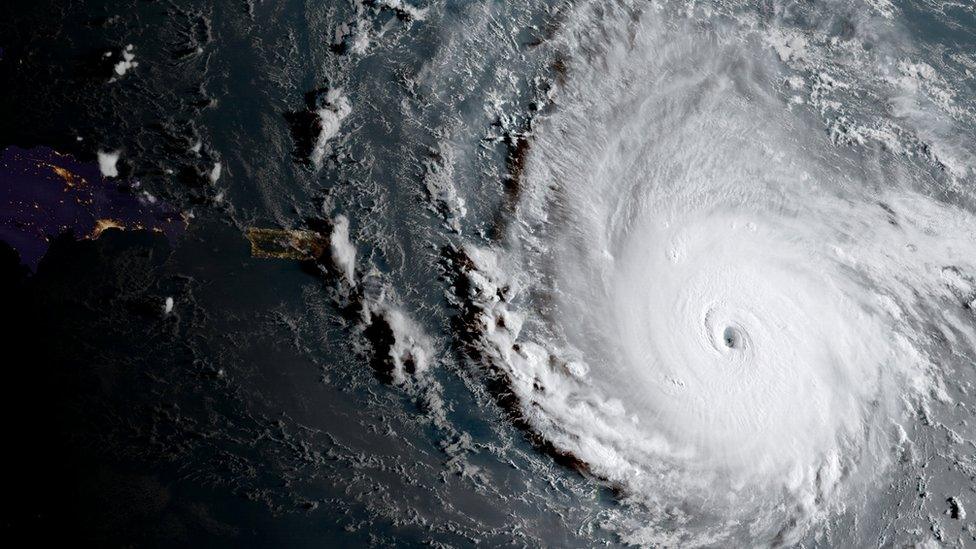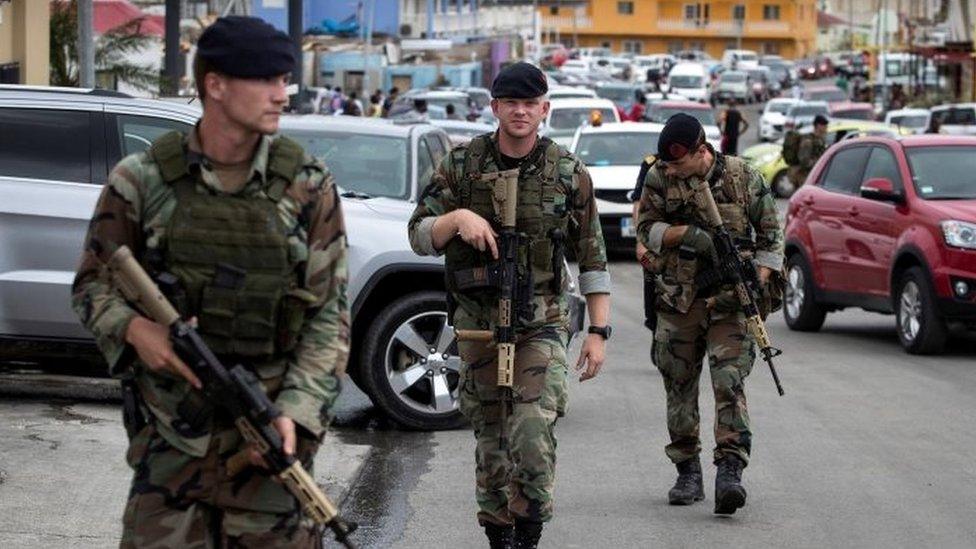Hurricane Irma: Caribbean islands left with trail of destruction
- Published
The BBC's correspondents in the region chart Irma's path of destruction
Before hitting Florida, Hurricane Irma caused catastrophic damage across the Caribbean, where it killed at least 37 people and left thousands homeless.
Irma, one of the most powerful storms ever recorded in the Atlantic basin, swept across islands including St Martin, Puerto Rico, Cuba, and the British and US Virgin Islands.
It left billions of dollars worth of damage, with some areas now "barely habitable".
Antigua and Barbuda
Hurricane Irma first struck the dual-island nation of Antigua and Barbuda on Wednesday. A young child was killed.
Prime Minister Gaston Browne said 95% of buildings on Barbuda had been damaged, and the island was "literally under water" and "barely habitable".
95% of Barbuda's buildings were destroyed
About 50% of the Barbuda population was now homeless, he told the BBC.
However, Antigua, with a population of 80,000, escaped major damage, with no loss of life.
"It was like a horror movie" - Residents of Barbuda describe the destruction wrought by Hurricane Irma
St Martin, St Barts and Anguilla
The category five storm then pummelled St Martin and St Barts - popular holiday destinations - on the same day.
The hurricane left more than two-thirds of homes on the Dutch side of the island of St Martin uninhabitable, with no electricity, gas or drinking water, and four people confirmed dead.
Before and after: Stills and footage show St Martin then and now
The French government has said its side of St Martin - known as Saint-Martin - has sustained about €1.2bn ($1.44bn; £1.1bn) in damage, with nine deaths across Saint-Martin and St Barts.
French Interior Minister Gerard Collomb said there had been "massive destruction" to the islands.
The nearby British overseas territory of Anguilla also had extensive damage, with one person killed.
British Virgin Islands and US Virgin Islands
Aerial footage shows the devastation that Hurricane Irma has caused.
There was widespread damage reported on both island chains after Irma hit them later on Wednesday, with five dead in the British Virgin Islands and at least four killed in the US Virgin Islands.
Sharon Flax-Brutus, director of tourism for the British Virgin Islands (BVI), said the damage was difficult to assess because communications were down, but that "many homes are without roofs, or have been diminished to merely foundations".
A survivor on Tortola: 'My roof blew off - I lost everything'
Following the storm, some residents described looting and said people were walking around with machetes to cut trees down.
BBC reporters have reached the island of Tortola, and say entire neighbourhoods have been flattened, while Richard Branson says most of the buildings and vegetation on Necker, the island owned by the billionaire, have been destroyed or damaged.
Puerto Rico
Hurricane Irma skirted Puerto Rico late on Wednesday, causing waves of up to 30ft (9m) off the capital San Juan.
Although the US territory avoided a direct hit, its infrastructure was badly affected - more than half of the island's three million residents were without power and officials said many could be cut off for several days.
At least three deaths were reported on the island.
Haiti and the Dominican Republic
Both countries were battered by the storm and experienced flooding, but neither had as much damage as initially feared.

Hurricane Irma's path across the Caribbean
Irma caused power outages and some damage to roofs and farms in the northern parts of the countries.
In the Dominican Republic, about 20,000 people were evacuated ahead of the storm.
Turks and Caicos Islands
Irma struck the Turks and Caicos on Thursday.
On the archipelago of Turks and Caicos, with its population of about 35,000, one witness described a drop in pressure that could be felt in people's chests.
Nasa images on Thursday show the eye of Irma over the Dominican Republic and Haiti
Irma ripped off roofs on the main island, Grand Turk, flooded streets, snapped utility poles and caused a widespread black-out.
Cuba
Ten people were killed after Irma made landfall on Cuba late on Friday - the first category five hurricane to hit the country in decades.
About a million people, including tens of thousands of tourists, were evacuated ahead of the storm.
Watch: Footage shows the central province of Villa Clara battered by wind and rain
The hurricane battered the north of the island for several hours, with storm surges partially engulfing villages and whole communities left homeless.
Trees and telegraph poles collapsed, and there were power outages across Havana.
Florida
Amateur footage shows flooding in central Miami
Irma arrived in Florida on Sunday as a category four storm.
Streets across the state were flooded and at least four deaths have so far been connected to the hurricane, which was downgraded to a tropical storm on Monday.
Millions remain without power, with the state's largest electricity provider, Florida Power & Light, saying some repairs make take time.
The clean-up operation in the US state has barely begun, but estimates by risk forecaster AIR Worldwide suggest $20bn to $40bn (£15bn to £30bn) in damage has been done to insured property alone.
Irma continues to move further inland.

Where the storm is projected to go next
- Published8 September 2017

- Published15 September 2017

- Published8 September 2017
- Published8 September 2017
